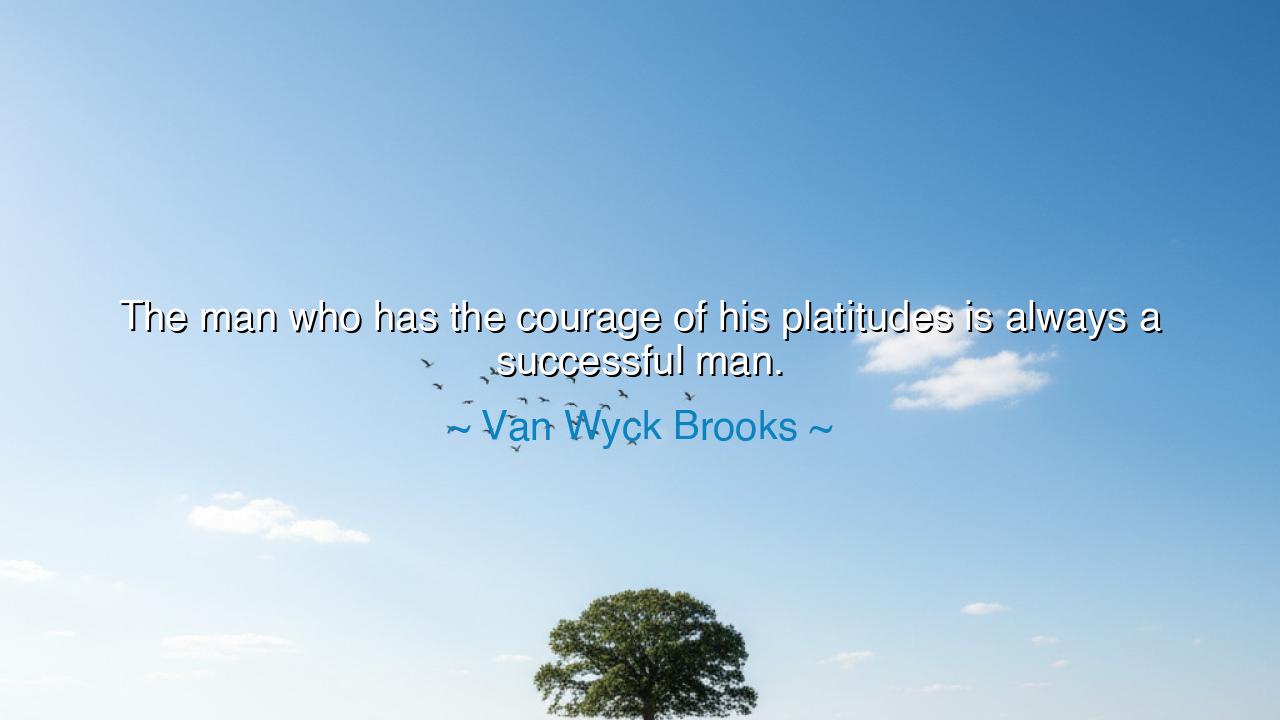
The man who has the courage of his platitudes is always a






The American critic and philosopher Van Wyck Brooks, ever a sharp observer of human character, once said: “The man who has the courage of his platitudes is always a successful man.” At first glance, these words seem tinged with irony, perhaps even mockery—but within them lies a profound reflection on the power of conviction and the nature of truth in simplicity. A platitude is a saying so familiar, so worn by repetition, that it seems almost empty. Yet Brooks reminds us that to live by such words, not merely to recite them, demands rare courage. For though wisdom is easily spoken, it is seldom lived. To hold steadfast to what is right, kind, and true in a world that sneers at simplicity—that is greatness.
The meaning of this quote lies not in praise of banality, but in reverence for integrity. Many dismiss platitudes because they seem obvious: “Honesty is the best policy,” “Hard work brings reward,” “Love conquers all.” Yet these old truths persist because they are the pillars upon which the soul stands upright. To have the courage of one’s platitudes is to live by them openly and without shame, even when cynics call them naïve. Brooks saw that success—whether in the quiet life of conscience or the grand arena of society—belongs not to the clever, but to the steadfast, to those who live by simple truths with unwavering faith.
Consider how many hide behind irony, afraid to appear sincere. In the modern world, wisdom has grown weary of itself; men mock what their grandfathers held sacred. Yet it takes far greater strength to say, “I believe in goodness, in duty, in love,” and to act upon it, than to cloak oneself in clever doubt. The cowardice of intellect often masquerades as wisdom; the true test is whether one dares to be genuine in an age of pretense. Brooks’s “successful man” is not necessarily one crowned with riches or applause, but one who dares to embody the truths others only utter.
History is filled with such men and women. Consider Abraham Lincoln, who lived by simple but immovable principles. He believed in fairness, humility, and perseverance—ideas so common they could have been dismissed as platitudes. Yet it was precisely his courage to act on them that made him great. He did not speak of equality as poetry; he fought for it as law. He did not treat honesty as an ornament of speech; he carried it as the banner of his life. Thus, he transformed common ideals into living fire, and his steadfast faith became the foundation upon which a nation was renewed.
Brooks’s insight, though spoken with a hint of irony, carries deep moral weight. He recognized that most people revere noble sentiments only in theory. They cheer them in sermons and speeches but abandon them in the marketplace and the battlefield of daily life. The courage of one’s platitudes means standing by truth even when it costs you comfort, reputation, or gain. It means refusing to compromise the timeless for the temporary. And because such courage is rare, those who possess it often rise above the mediocrity of compromise and earn not only success but the deeper triumph of self-respect.
In this light, the quote is not satire—it is a challenge. It asks: Do you have the courage to live your own wisdom? Will you remain kind when others mock kindness as weakness? Will you remain honest when deception is easier? Will you keep faith when the world rewards cynicism? Those who answer “yes” become the quiet heroes of their age. They may not dazzle with novelty, but they endure, for the truths they live by are as old and unbreakable as the earth itself.
The lesson is this: Do not despise the simplicity of virtue. The highest truths are not the most intricate, but the most eternal. Speak less of principles, and live them more fiercely. Let your platitudes become your practice, and your practice your power. For the man or woman who dares to live in alignment with truth, who holds fast to goodness though the world scorns it, will indeed be successful—not only in outward things, but in the noble victory of the soul. And when the ages pass and cleverness fades, what remains are those timeless lives that proved that courage and sincerity are, and always will be, the truest marks of greatness.






AAdministratorAdministrator
Welcome, honored guests. Please leave a comment, we will respond soon